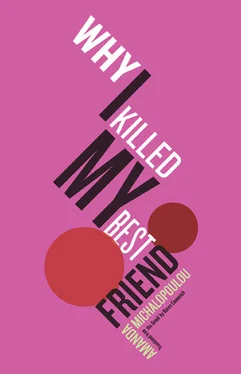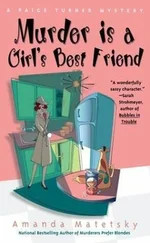“Where did she come from? How did she get into the house?”
“Who, honey? Calm down! You were having a nightmare. Haven’t I told you not to sleep without a blanket? You’ll catch cold.”
I pull the blanket over my head, making a little cave. Mom shuffles out of the room, slippers flapping. She stops at the door, hesitates.
“Do you want a candy?”
She always carries candy in her pockets. On her visits to schools she treats the kids as if they were horses. She stuffs them full of candy, so you can’t ever tell if she’s actually their favorite writer or just a grandmother spoiling her grandchildren rotten. Personally I think her stories are atrocious, full of friendly colonists and cheeky little African kids, but then again she thinks I’m useless and don’t even know how to draw. “What are those things you draw, honey? I could do that as well as you can!” She took my charcoals, copied a few of my oldest and worst sketches, and now passes herself off as an illustrator, too.
“Maria, I know you don’t like it when I tell you this, but you still grind your teeth in your sleep.”
“Okay, Mom, fine. .”
“Honey, you have to be careful, that’s how you broke your tooth when you were little.”
I pull the blanket down off my head.
“What exactly do you want me to do about it?”
“Don’t get annoyed. I’m just saying you should be careful.”
I feel like telling her it’s a sign of stress, something that stuck with me from the cave and the crickets. But I don’t say anything. After all, I wasn’t the only one who took years to recover.
“Turn around so we can see!”
Stella grabs the skirt of the dress I brought her and pulls it up just a smidge; her plump little legs do a girly spin in place. Then she starts to dance.
“Look at my little cabaret girl!” Martha says.
“Just yesterday she was learning to crawl, and now she’s turning six!”
“You haven’t seen the baby yet, either. .”
“Oh, it’s fine, let’s not wake him up. I want to hear your news.”
Martha is sitting in her favorite spot on the sofa — I can tell because it’s where the cushion sags. Her belly is still swollen from her second pregnancy, and she has that lost, half-pleading expression on her face of a woman who’s recently given birth.
“What news could I possibly have?”
“How’s Fotini?”
“We’ve sort of lost touch. She and I are so different, Maria. She never even calls to talk to Stella, can you believe it? She’s opposed to the nuclear family, she says. I mean, really, revolution? Who still cares about revolution these days? She’s thirty-five years old! How stubborn can she be?”
Oh, Martha, if you only knew how I live. Writing proclamations in an apartment with bad plumbing. I come here bearing dresses with lace trim, like the ones they used to make me wear. I come for Stella, who was once the baby I knitted hats for and pushed in her stroller on the dock. But I also come in hopes of figuring out what on earth goes on in the head of a girl who’s six, seven, eight years old. How she can shut out the whole world and just spin in circles around her own axis.
“What about your mother, how’s she?” I ask, to change the subject.
“She’s basically an invalid, just one illness after the next. If it’s not some bug it’s her back.”
“I’m sorry, Martha. It’s not serious, though, is it?”
Martha tells me about her mother’s near mania for illnesses, her quiet depression, her constant hypoglycemia. Then she asks, “Who was it who gave my mother that name, anyhow?”
“My friend Anna, remember her?”
“Of course. Who could forget that girl? I always felt like punching her in the face.”
“Why?”
“You really have to ask? I’ve never met a bigger, more frightening ego in my life.”
Merde. Neither have I.
“Do you have to leave so soon?”
“I’ve got things to do, Mom.”
“What things?”
Well, let’s see, we’re planning an event in the Athens Metro, it’s been too long since we had a good, old-fashioned run-in with the police, with that absurd mediocrity that goes by the name of order. Every now and then we smash a shop window or two — a small, symbolic tear in the cloak of legitimacy that enfolds private property. But we’re not nearly as active as we used to be. Kayo and I are the only ones with keys to the apartment, it’s not all anything goes anymore. We don’t just wreak havoc indiscriminately, either. And we’ve improved the fonts on our signs. We’re revolutionaries with taste.
“I told you, Mom, things!”
“You live such a strange life, child. I just don’t understand. The way I was raised, no matter how wrong life went, at age thirty-five a woman had a husband, kids, something to keep her busy.”
“No matter how wrong things go, salt never gets worms, right, Mom?”
In my case, apparently, some inner worm has been eating away at the fear of God, at the desire for a family, at all the illusions that keep Mom alive.
“Let the girl do what she needs to,” Dad calls from the living room. “Stop sticking your nose in all the time!”
They stand in the doorway, framed by flaking paint. To me they look older than ever, and as crazy as loons. Mom in her shawl, nails painted with peeling white polish. Dad in his prehistoric gym suit with the sagging knees. They’re like little kids — like my kids.
“I should really paint the door jambs,” Dad mutters.
“Just put newspaper on the ground if you do,” Mom says. “I don’t want you making a mess.”
Perhaps I really did run away when I was nine years old, when I got out that checked suitcase and filled it with bananas, roller skates, colored pencils. I thought the stewardesses would have to take pity on me in order for me to get back to Africa. But perhaps you don’t even need the airplane. Perhaps all it takes is a decision.
It’s one of those days that makes you happy, though you couldn’t say why. The Attic sky is that mysterious blue you see in tourist brochures: transparent, yet concealing something — whatever you want it to. Spring sneaks into your head, the sun numbs your temples. Athens glistens as if made of cheap glass. A quaver of heat and exhaust and spring sweetness spreads itself over everything, making the cement in the schoolyard shimmer. Today even Daphne drew a sun over her cave and grass all around. On days like this the kids are calm. They laugh at the drop of a hat, not in a hysterical way, but as if one of Mom’s saints is watching over them. There’s a kind of saintliness in the air — even if I don’t believe in that sort of thing.
I’m alone in the classroom. When I was in grade school we always clambered up to the teacher’s desk at the end of class. Clambered, because the desk was on a wooden riser that divided the classroom into two tiers: pupils on one, the teacher on the other. Anna and I would experiment with stolen moments of intoxicating power: “I’m going to sit in Kyria Aphrodite’s chair!” Anna would shriek. “No, I am, merde!” We both could have fit, but Anna, the more stubborn, always won. From the first time she crossed my path, I learned to give way, to cede my place to her. Which is perhaps one reason why I now feel as if I don’t belong anywhere. Though things have changed somewhat: there’s a certain order to my life now, the squeak of markers on paper, the apartment in Exarheia, the demonstrations. There are regions that belong to each of us individually, while others are larger, broader, belonging to us all.
And into that broader realm now steps a thin woman in tall cowboy boots. I catch sight of her when she’s still at the far end of the hall; as she approaches it becomes more and more obvious that she’s one of those nutcase mothers who experience a rare and sudden flash of interest in their child and come in to pester us with questions. I can tell from the clothes: a sane person wouldn’t show up to her child’s school in sequin-studded jeans and a red leather jacket. Lord, she’s headed my way. It’s probably Natasha’s mom, come to complain about Daphne picking fights.
Читать дальше












